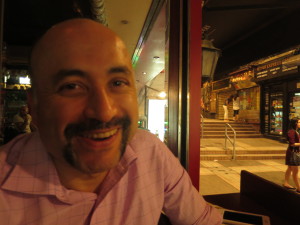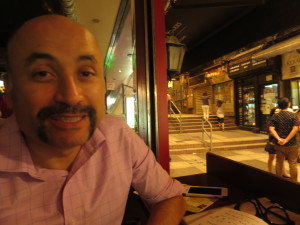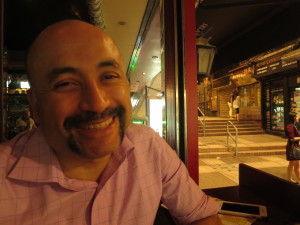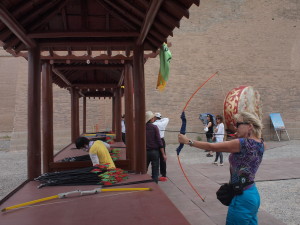- Details
Old China Hand Foot and Mouth Disease
Last weekend again saw me in my beloved Shenzhen to shoot some of the last scenes for the upcoming Cantonese teaching DVD called DWD 2. Yes, the ultimate in the latest teaching technology, in colour. →
- Details
The End Of The Wall As We Know It
This is probably my favourite spot in all of China – apart from the Lo Wu Shopping Center of course. It’s Jiayuguan Fort far into Gansu province and is said to be the end of →
Don’t Trust That Internet
Last year I went from Lanzhou to Xiahe, a Tibetan stronghold, by bus. I had read in a book about the Silk Road that this would involve an “eight hour hair-raising bus trip” and looked →
Day Trip To Tibet
Not far from Lanzhou, transport and travel hub of the north, is the small town of Xiahe, dominated by the large and imposing Labrang Monastery. Last time I went there the main drag (the only →
Lanzhou, King of the North
Despite the charms of the Chinese train and that to travel hopefully (and painfully) is better than … not at all, it’s always good to arrive when the destination is beautiful Lanzhou. It’s the most →
On The Road Again
Yes, although this isn’t strictly about language and certainly not Cantonese as I’m Mando-jabbering all day long, I want to put these postings from my blog www.chinadroll.com here as well. Travel broadens the mind, narrows →
By Popular Demand (Journey Into the Hinterland)
.. an old podcast: A Sojourn in Shenzhen. Yes, one whole person has expressed interest in hearing it, so I must oblige. Also I happen to be going to Shenzhen again tomorrow as part of →
It’s So Close, I can Almost Feel Its Rancid Breath …
Yes, soon you’ll be able to download more than three hours of Canto magic from this very site!I met my computer expert friend yesterday behind the third toilet from the left, and handed over the →
Non-white IS The New Black
Oh, whoops, how did a burqa sneak in there? Must have been the word ‘black’. Anyway, so most of my students have the same complaint: No matter how good their Cantonese is, Hong Kong people →
Language!
Forget about Chinglish/Manglish; at least it’s funny. The worst English in the world has got to be corporate-speak: Corpselish. There’s a company that’s been spamming me for about a year now: CHaINA LIVE. My first →
дима: Ты лучше всех!
I’ve just come back from another Russian lesson with the excellent Dimitri. People: You think Cantonese is difficult – try Russian. Every word, I mean noun, adjective, verb and adverb, has hundreds of different forms. →
- Details
It’s All About Face
Here is one of my students – let’s call him X-tor. Like so many he succumbed to “MOvember,” the terrible annual male uglification-fest where guys deliberately mutilate their faces to get people to give them money to save other guys’ organs. (That’s my understanding of MOvember anyway.)

Now, I’ve known X-tor for years. He’s a good man, a pleasant man and a man whose face exudes kindness. But as soon as he got the rodent-thing draped around his lip it was as if he wasn’t him anymore. My mind knew it was him, I heard his voice coming out of his mouth, but my eyes saw a stranger; some kind of drug dealer who was going to stab me to death for $25. It was very disconcerting.
It made me think about how important the eyes are, how much more important than the ears, say.
If you’re white or non-Asian and learning Cantonese, this, not the language itself will forever be the biggest hurdle. (As well as HK people’s attitude to foreigners learning Cantonese, but more about that in a future post.)
When HK people see a non-Asian face, they brace themselves for English. Only English can come out of that face. Even if it’s fluent Cantonese, they still think it’s English because the face tells them so. That’s why no matter how fluent you are in Cantonese, 99% of all HK people, will answer you in English when you address them. Or they simply “won’t understand” their own language. Their eyes told them English was coming, so what could this possibly be?

That, and not the tones or the ridiculously simple grammar, makes Cantonese difficult.
學生 (Hok saang – student)
唔識聽 (M sek teng – don’t understand)
十一月 (Sap yat yuet – NOvember)
- Details
Only Whitey Can Be Racist
I have in my hand (and when I say hand I mean computer screen) an extraordinary document entitled “Tool: Recognizing Microaggressions and the Messages They Send”.
Reading through the list, I’m damned glad to be your common or garden white oppressor and not some “person of color” as is frequently mentioned in the document. Yes color without the u, because it is of course an American document, issued by the UCLA. So, what are “microaggressions”? you may wonder.
“Microaggressions are the everyday verbal, nonverbal, and environmental slights, snubs, or insults, whether intentional or unintentional, that communicate hostile, derogatory, or negative messages to target persons based solely upon their marginalized group membership.” it says in the introduction. Unintentional too, eh? Makes living in the US rather a minefield, what?
But only if you’re white, fortunately. As we all know, only white people have ever been and can ever be racist. Everybody else is just getting their own back or following their culture. I’m glad, because otherwise I might start feeling I was being slighted, snubbed, and, yes, insulted, pretty much every single day in verbal and non-verbal ways. Don’t know about “environmental slights” though. I’ll leave that to trees for the time being.
The document kicks off with the ultimate insult: “Where are you from.” OR “where were you born.” Yes, I do realise it must be irritating for a person of colour (Racist! Isn’t ‘beige’ a colour?), American born and bred, to be asked where they’re from, but a quick “Kansas City, Missouri. How about you?” should quickly put paid to it, one would think.
When Chinese people ask me where I’m from and I say “Hong Kong” they say “no,” and then start arguing, some quite angrily. Being a white oppressor, I rather enjoy the arguments. Good thing I don’t have a colour otherwise I might see their comments as hostile or derogatory.
Insult 2: “You speak English very well.” Again, an unbearable slight from which it must be hard to recover – if you are of colour, that is. As a whitey, I am slowed down for minutes every day while people applaud or roll on the floor laughing because I can say “hello” in the local language after studying it for 25 years.
Today I was in a shop in Mui Wo talking to a appliance-monger about an electric kettle. When I left, I almost missed the ferry because two women stood outside the shop blocking my way, gaping, staring and applauding, wanting me to speak Cantonese to them while standing up at the same time.
I’ll get back to this tomorrow. Now I have to go to work teaching Cantonese, a job, locals tell me incessantly, I “can’t do because I’m not Chinese”. Wonder what UCLA would say about that!
Contact us today
Email info@learncantonese.com.hk
to find out how you can start learning Cantonese.




